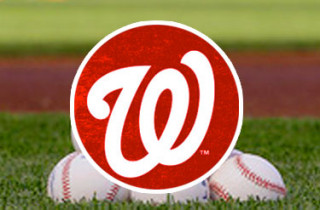As things currently stand, there is no spot in the Nationals lineup for Michael A. Taylor. He would seem to fit in well as the club's fourth outfielder, one who is well-equipped to take over at any position if anyone else got hurt. Of course, all of that depends on the 28-year-old showing he can hit with consistency at the big league level. And if there are any doubts about his ability to do that, the Nats might be wise to see what kind of trade value he has.
Any of this sound familiar? It's the conversation surrounding Taylor right now, but it already was the conversation surrounding Taylor last winter. And the winter before that. And the winter before that.
 Suffice it to say, we've been here before. Taylor is both a valuable member of the organization and an inconsistent hitter who at times looks like a big-time performer and at times looks like he'll never figure it out at this level. He's the perfect backup outfielder, but he might have trade value that's worth taking advantage of in the coming weeks.
Suffice it to say, we've been here before. Taylor is both a valuable member of the organization and an inconsistent hitter who at times looks like a big-time performer and at times looks like he'll never figure it out at this level. He's the perfect backup outfielder, but he might have trade value that's worth taking advantage of in the coming weeks.
The story never really changes. Taylor does just enough to make himself valuable to the Nationals but not enough to convince you he's finally turned a corner.
How does the organization feel about him at this point?
"We think he's a competent major league player," general manager Mike Rizzo said earlier this week at the Winter Meetings in San Diego. "His skill-set is terrific. He's a premier defender. He's got as good an arm as anybody. He's a great basestealer and baserunner. And he's got big power."
That's all true. But what's also true is that Taylor spent the majority of this season at Double-A Harrisburg because he wasn't good enough to deserve a spot on the 25-man big league roster. Only after rosters expanded in September did he return. And come October, he was contributing to the Nationals' World Series run by hitting .333 (7-for-21) with two homers while starting in center field for the injured Victor Robles.
It offered up yet another reason for club officials to believe Taylor had finally honed his swing, taking advantage of his prolonged stint in Harrisburg to correct some long-festering issues with his swing.
"The thing he has to work on, the thing he did work on when he was down in the minor leagues, he improved greatly on pitch recognition and his contact rate," Rizzo said. "When he came back up after the minor leagues, he was much better at it, much more patient at the plate, swinging at strikes and taking pitches off the plate. If he continues that, he's a really good player for us. And a guy that's important to us. Because when those big three go down, then you have yourself a real major league guy that can really play for an extended period of time."
Taylor may have performed well in the playoffs, but not well enough to merit a starting job heading into 2020. Robles, Juan Soto and Adam Eaton have those locked up.
So where does that leave Taylor and the Nationals? Either as an expensive backup outfielder who will make more than his $3.25 million salary from this season thanks to the arbitration process. Or as trade bait for other clubs who might actually have a regular job for him and might be willing to give up something that helps the Nats address a different hole in their roster.
"He's been sought after in several deals," Rizzo admitted when asked if Taylor's name comes up in trade discussions. The GM wouldn't go into any more detail than that.
Rizzo said that this week at the Winter Meetings. Given the history, he easily could've said the same thing the last three Winter Meetings.
By accepting you will be accessing a service provided by a third-party external to https://www.masnsports.com/





